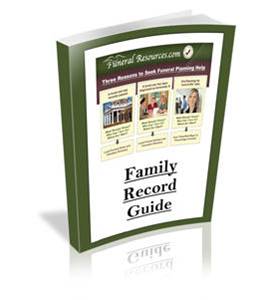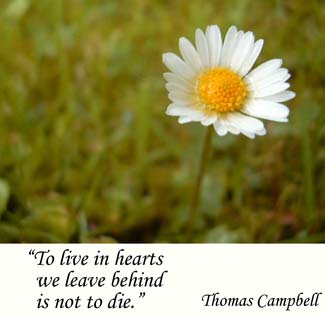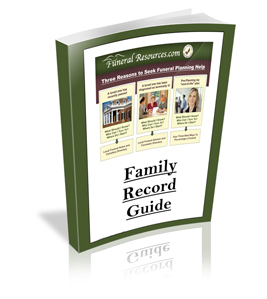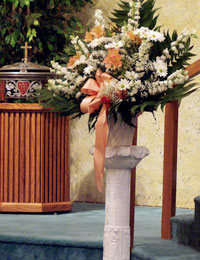Best Ways to Prepay Funeral Expenses
How to Prepay Your Funeral Expenses…
And Why?
According to AARP (www.aarp.org), the average cost of a funeral today is approximately $10,000. So by preplanning a funeral and creating an end of life plan, your are certainly doing a wonderful thing by helping to alleviate many of the funeral planning challenges.
Therefore, over 60% of people who are willing to selflessly take the time to create an End of Life Plan will also choose to prepay their funeral expenses. By taking care of your funeral costs and expenses in advance, this is yet another added value. Prepaying your funeral costs is another way of leaving behind a memory of how much you cared for your family and loved ones, rather than leaving them to deal with these financial challenges.
While you need to learn and understand the three most common ways to preplan a funeral, you should also be familiar with the various ways of prepaying your funeral expenses, since this is one of the fastest growing and widely-accepted aspects of the funeral planning process.
Similar to preplanning your funeral, most financial professionals agree that prepaying your funeral expenses should be a standard topic of discussion when creating a financial plan and estate plan.
The most common and widely used strategies to prepay your funeral expenses are savings, life insurance, and funeral insurance (also referred to as burial insurance), mainly because they tend to be deemed the most reliable and readily available. However, there are several other finance advice strategies to consider when prepaying your funeral costs or expenses:
Savings
Although many people choose to set aside savings to pay for their end of life plan and funeral expenses, there are several reasons this does not always end up working out as originally planned. First, the savings can be depleted based on unexpected financial circumstances, such as health or financial issues. Second, these funds are not always readily available and liquid upon death due to the challenges and restrictions often found in estate planning. Third, the funds set aside can often be insufficient due to inflation and the rising cost of funeral expenses. Finally, it should be noted that savings are included in a part of one’s estate, and, thus, the taxable consequences can often come into play.
Life Insurance
Term Life Insurance is widely considered to be a flexible, simple, and affordable way to pay for your final funeral expenses. Although Term Life Insurance has a set term, or set number of years, it also has multiple uses in prepaying for your funeral. Because upon your death it becomes a liquid asset that is usually not part of your estate, it can be used for many things such as your funeral or memorial services, burial expenses, cremation, liquidity, and many other things, including debts or obligations.
In addition, there are some types of life insurance that allow the funds contributed to these policies (either in lump sum, monthly, quarterly, semi-annually, or annually) to grow and accumulate as a cash value that can be accessed if necessary. Therefore, these policies can not only be used for funeral expenses, but also for other financial planning options that may arise such as financial emergencies, and college.
Funeral Insurance
Funeral insurance is an insurance policy which is specifically designed to cover any costs or expenses which are directly related to your funeral. If you purchase one of these policies, one of the options you have is to determine exactly which funeral costs or expenses are to be covered, such as funeral flowers, burial plot, grave marker, and much more. Another option you have is for the policy to be paid out in a single lump-sum, which can be used to cover your pre-determined costs or expenses, or simply help your loved ones financially as they plan for you. There are many insurance companies that offer funeral planning packages, and certain funeral homes or funeral companies also offer funeral insurance policies.
Pre Need Trust Agreements
Another alternative to prepaying your funeral is to consider a Pre Need Trust Agreement to pay for your costs or expenses. Generally speaking, these Trust accounts are typically funded with monthly payments that are invested in a fund which is designed to grow over time. Although a Trust account is designed to provide the potential for protection against inflation, it is not guaranteed to do so.
Get Help
Although the large majority of the funeral industry will tell you that most funeral costs can range anywhere from $5,000 – $10,000, it is very common for funerals to cost much more or maybe even less.
Also, as with any important financial decision or investment, there are many advantages and disadvantages to each of the options mentioned above. Before choosing a policy, it is important to consider many things, including but not limited to your age, health, financial status, objectives, liquid assets, tax issues, estate tax issues, family needs, etc.
In summary, although nobody likes to think or talk about dying, it is one of the facts of life we all must eventually face. If you are trying to build a successful financial plan, the only way you can be sure your plan works smoothly and efficiently is to be proactive about your planning process. This is particularly true and necessary when creating a proper plan of succession, and everyone should consider including an end of life plan.
Please consult with your attorney or financial advisor before applying or purchasing any of these policies, pay close attention to your specific state requirements, and also the financial strength and claims paying abilities of each company, funeral home, etc.
























